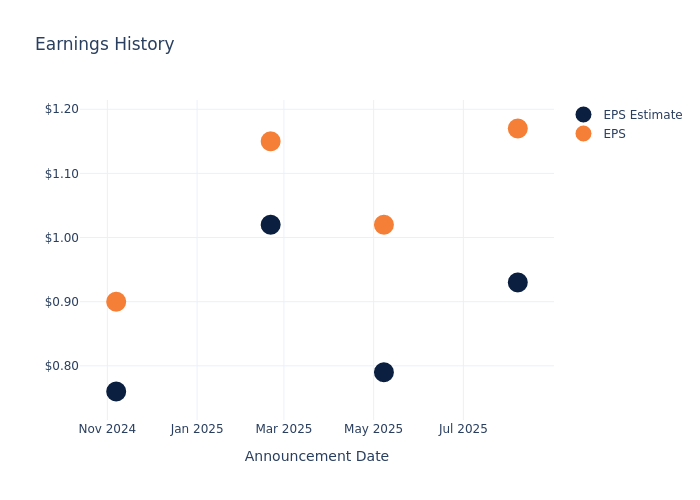Examining the Future: Insulet's Earnings Outlook
Author: Benzinga Insights | November 05, 2025 10:02am
Insulet (NASDAQ:PODD) will release its quarterly earnings report on Thursday, 2025-11-06. Here's a brief overview for investors ahead of the announcement.
Analysts anticipate Insulet to report an earnings per share (EPS) of $1.14.
The market awaits Insulet's announcement, with hopes high for news of surpassing estimates and providing upbeat guidance for the next quarter.
It's important for new investors to understand that guidance can be a significant driver of stock prices.
Historical Earnings Performance
During the last quarter, the company reported an EPS beat by $0.24, leading to a 1.17% increase in the share price on the subsequent day.
Here's a look at Insulet's past performance and the resulting price change:
| Quarter |
Q2 2025 |
Q1 2025 |
Q4 2024 |
Q3 2024 |
| EPS Estimate |
0.93 |
0.79 |
1.02 |
0.76 |
| EPS Actual |
1.17 |
1.02 |
1.15 |
0.90 |
| Price Change % |
1.00 |
21.00 |
-2.00 |
9.00 |

Market Performance of Insulet's Stock
Shares of Insulet were trading at $320.27 as of November 04. Over the last 52-week period, shares are up 26.74%. Given that these returns are generally positive, long-term shareholders should be satisfied going into this earnings release.
Insights Shared by Analysts on Insulet
For investors, staying informed about market sentiments and expectations in the industry is paramount. This analysis provides an exploration of the latest insights on Insulet.
Analysts have given Insulet a total of 7 ratings, with the consensus rating being Buy. The average one-year price target is $355.29, indicating a potential 10.93% upside.
Analyzing Ratings Among Peers
The below comparison of the analyst ratings and average 1-year price targets of Zimmer Biomet Holdings, Steris and DexCom, three prominent players in the industry, gives insights for their relative performance expectations and market positioning.
- Analysts currently favor an Buy trajectory for Zimmer Biomet Holdings, with an average 1-year price target of $112.38, suggesting a potential 64.91% downside.
- Analysts currently favor an Outperform trajectory for Steris, with an average 1-year price target of $295.0, suggesting a potential 7.89% downside.
- Analysts currently favor an Buy trajectory for DexCom, with an average 1-year price target of $87.61, suggesting a potential 72.64% downside.
Peer Analysis Summary
The peer analysis summary presents essential metrics for Zimmer Biomet Holdings, Steris and DexCom, unveiling their respective standings within the industry and providing valuable insights into their market positions and comparative performance.
| Company |
Consensus |
Revenue Growth |
Gross Profit |
Return on Equity |
| Insulet |
Buy |
32.88% |
$452.20M |
1.61% |
| Zimmer Biomet Holdings |
Buy |
6.97% |
$1.49B |
1.23% |
| Steris |
Outperform |
8.72% |
$628M |
2.62% |
| DexCom |
Buy |
21.64% |
$731.40M |
10.71% |
Key Takeaway:
Insulet ranks highest in Revenue Growth among its peers. It is at the bottom in Gross Profit. Insulet is at the bottom in Return on Equity.
About Insulet
Insulet was founded in 2000 with the goal of making continuous subcutaneous insulin infusion therapy for diabetes easier to use. The result was the Omnipod system, which consists of a small disposable insulin infusion device that can be operated through a smartphone to control dosage. Since the Omnipod was approved by the US Food and Drug Administration in 2005, approximately 500,000 insulin-dependent diabetic patients are using it worldwide.
Insulet's Financial Performance
Market Capitalization Analysis: Below industry benchmarks, the company's market capitalization reflects a smaller scale relative to peers. This could be attributed to factors such as growth expectations or operational capacity.
Positive Revenue Trend: Examining Insulet's financials over 3 months reveals a positive narrative. The company achieved a noteworthy revenue growth rate of 32.88% as of 30 June, 2025, showcasing a substantial increase in top-line earnings. In comparison to its industry peers, the company stands out with a growth rate higher than the average among peers in the Health Care sector.
Net Margin: Insulet's net margin is below industry averages, indicating potential challenges in maintaining strong profitability. With a net margin of 3.47%, the company may face hurdles in effective cost management.
Return on Equity (ROE): Insulet's ROE is below industry averages, indicating potential challenges in efficiently utilizing equity capital. With an ROE of 1.61%, the company may face hurdles in achieving optimal financial returns.
Return on Assets (ROA): Insulet's ROA falls below industry averages, indicating challenges in efficiently utilizing assets. With an ROA of 0.64%, the company may face hurdles in generating optimal returns from its assets.
Debt Management: Insulet's debt-to-equity ratio surpasses industry norms, standing at 0.96. This suggests the company carries a substantial amount of debt, posing potential financial challenges.
To track all earnings releases for Insulet visit their earnings calendar on our site.
This article was generated by Benzinga's automated content engine and reviewed by an editor.
Posted In: PODD





